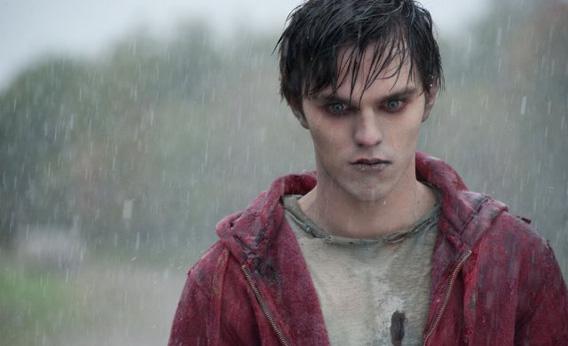Warm Bodies
This zom-rom-com isn’t mindless, but it is a little bit lifeless.

Photo by Jonathan Wenk © 2012 Summit Entertainment, LLC.
After you've seen Warm Bodies, come back and listen to our Spoiler Special podcast with Dana Stevens and Keith Phipps. Click the audio player below or download the podcast.
There’s a built-in obstacle to the high concept of Warm Bodies, from writer/director Jonathan Levine, whose zombie rom-com riffs on the Twilight formula of pairing a mortal girl with an undead boy: Not many people fantasize about getting it on with a zombie. Vampires—at least movie vampires, who have long existed at a considerable remove from Bram Stoker’s original, foul-breathed Count Dracula—are brooding, suave, marble-skinned, and sexy, possessed of superhuman physical gifts of strength and speed. Zombies are shuffling, mindless, visibly decaying ambulatory corpses who (with rare exceptions, as in the 28 Days movies) can be outrun by all but the lowest-paid movie extras. In the Twilight series, Edward was a teenager preserved eternally at the height of his youthful beauty. R. (Nicholas Hoult), the undead hero of Warm Bodies, looks more like a pouty-lipped teen idol whose body has been moldering for six months in a dumpster.
The fact of zombies’ relative unsexiness needn’t necessarily preclude the possibility of a zom-rom-com, but Levine’s likable-enough fourth feature (his first three were All the Boys Love Mandy Lane, The Wackness, and 50/50) never quite rises to the challenge. I did enjoy Warm Bodies’ premise, as explained in a quite funny opening voice-over that riffs on the loneliness of the single boy in the unfeeling crowd. R., a particularly soulful and introspective young zombie, introduces the post-apocalyptic landscape he calls home as he reflects that, when you spend most of your days staggering through an abandoned airport past crowds of fellow lurching brain-eaters, it’s tough to really connect. The closest thing he has to a friend is M. (Rob Corddry), who occasionally sits with R. at a dust-covered airport bar and grunts sympathetically.
The zombie community inhabits a shadow world whose laws and customs are never quite clear—a fuzziness that becomes a real problem in the movie’s plot-driven third act. After a global apocalypse whose origin, like his full name, R. can no longer remember, the world has been divided into the undead and the living, who build fortified walls to protect themselves from the marauding brain-eaters on the other side. General Grigio (an off-his-game John Malkovich), who seems—again vaguely—to be the commander of an anti-zombie militia, sends a group of young fighters, including his daughter Julie (Teresa Palmer), on a mission across the wall. Nearly all the humans are killed in a zombie raid, but fair Julie gets rescued by R., who’s fallen in love at first sight. He takes her to his hideout on an abandoned airplane—a hovel full of vinyl records and other treasures R. has scavenged from the once beautiful world around him.
This middle section, which should have been the movie’s most charming, never quite takes off into the romantic stratosphere. Maybe that’s because R.’s refusal to take Julie back to the world of the living upon her request smacks uncomfortably of abduction—though he insists he’s only trying to keep her safe from the brain-eaters, there are hints that he’s exaggerating the risk in order to keep her there longer. Or maybe it’s just that the ramping up of their romance is too uneven—in one scene Julie is shrinking in repulsion from the monster who’s holding her hostage; in the next she’s taking him for a giggly joyride in a long-undriven sportscar.
Nicholas Hoult’s shambling, insecure hero has an appealingly guileless sweetness, but it’s hard to do a lot with a character whose history and motives are this vague. (Why does R., alone among zombies, have this capacity for self-reflection?) It doesn’t help that R. speaks mainly in grunts for the first half of the film, though his voice-over— “Don’t be creepy, don’t be creepy,” he instructs himself as he nervously approaches his beloved—provides some welcome psychological context, as well as the majority of the movie’s laughs.
The preternaturally pretty Palmer brings an unusual amount of spunk to her damsel-in-distress role—she has a game, jock-ish quality that makes her believable as a warrior and could have seen her through better action scenes than this movie provides. Levine seems more at ease with the scenes involving romance and friendship (including a touching dramatic moment with an unusually subdued Corddry) than during the choppy, rushed late sequences in which zombies and humans alike are set upon by a digitally animated army of “bonies”: extra-dessicated, fast-moving superzombies who are never entirely convincing either as a plot contrivance, a threat, or a special effect.
Warm Bodies, which is based on a novel by Isaac Marion, explicitly presents itself as a Romeo and Juliet story, from the names of its central couple to a classic wherefore-art-thou balcony scene. But though it’s about a pair of lovers whose passion is strong enough to break down the barriers between life and death, this mildly amusing, sort-of-sweet comedy is strangely sexless and passion-free—these bodies, whether human or zombie, feel room-temperature at best.
